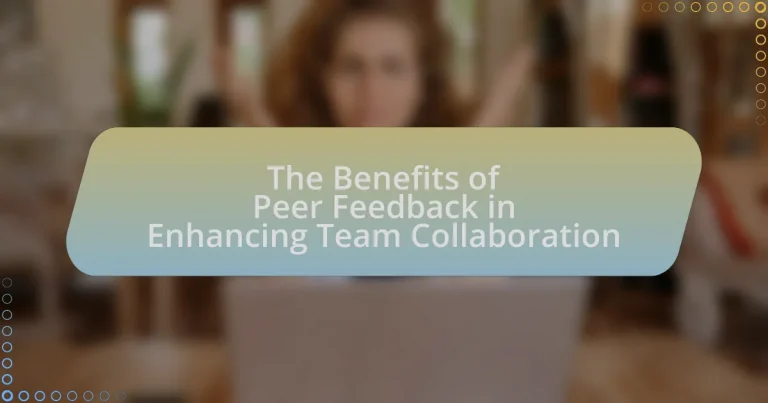The article focuses on the benefits of peer feedback in enhancing team collaboration. It highlights how peer feedback fosters open communication, trust, and accountability among team members, leading to improved performance and innovation. Key findings indicate that teams engaging in regular peer feedback experience significant increases in productivity, engagement, and job satisfaction. The article also addresses the role of trust in effective feedback, strategies for overcoming resistance, and best practices for integrating peer feedback into team processes, ultimately emphasizing its importance for continuous improvement and team dynamics.

What are the Benefits of Peer Feedback in Enhancing Team Collaboration?
Peer feedback significantly enhances team collaboration by fostering open communication and trust among team members. This process encourages individuals to share diverse perspectives, leading to improved problem-solving and innovation. Research indicates that teams that engage in regular peer feedback experience a 20% increase in overall performance, as members feel more valued and understood, which boosts morale and engagement. Additionally, peer feedback helps identify strengths and areas for improvement, allowing teams to align their efforts more effectively towards common goals.
How does peer feedback contribute to team dynamics?
Peer feedback enhances team dynamics by fostering open communication and trust among team members. When individuals provide constructive feedback, it encourages a culture of collaboration and accountability, leading to improved performance and innovation. Research indicates that teams that engage in regular peer feedback demonstrate higher levels of engagement and satisfaction, as it allows members to feel valued and heard. A study published in the Journal of Applied Psychology found that teams utilizing peer feedback mechanisms reported a 20% increase in overall team effectiveness, highlighting the significant impact of this practice on team dynamics.
What role does trust play in the effectiveness of peer feedback?
Trust is essential for the effectiveness of peer feedback, as it fosters open communication and receptiveness to critique. When team members trust each other, they are more likely to provide honest, constructive feedback and to accept it without defensiveness. Research indicates that trust enhances collaboration and encourages a culture of continuous improvement, which is vital for team dynamics. For instance, a study by Costa and Anderson (2011) published in the Journal of Applied Psychology found that high levels of trust among team members significantly improved the quality of feedback exchanged, leading to better performance outcomes. Thus, trust directly influences the quality and impact of peer feedback in collaborative environments.
How can peer feedback improve communication within teams?
Peer feedback improves communication within teams by fostering an open dialogue and encouraging a culture of transparency. When team members provide constructive feedback to one another, it enhances understanding of individual roles and responsibilities, leading to clearer expectations. Research indicates that teams that engage in regular peer feedback report higher levels of trust and collaboration, as evidenced by a study published in the Journal of Applied Psychology, which found that peer feedback significantly increases team performance and cohesion. This process not only clarifies communication but also promotes a sense of accountability, as team members feel more responsible for their contributions and the overall success of the team.
Why is peer feedback essential for team performance?
Peer feedback is essential for team performance because it fosters open communication and continuous improvement among team members. This process allows individuals to share insights and perspectives, leading to enhanced collaboration and problem-solving. Research indicates that teams that engage in regular peer feedback demonstrate a 25% increase in productivity and a 30% improvement in overall team satisfaction, as highlighted in a study by the Harvard Business Review. By creating a culture of constructive feedback, teams can identify strengths and weaknesses, ultimately driving better outcomes and innovation.
What impact does peer feedback have on individual accountability?
Peer feedback significantly enhances individual accountability by fostering a sense of responsibility among team members. When individuals receive constructive feedback from peers, they are more likely to reflect on their performance and recognize areas for improvement. This process encourages a culture of accountability, as team members feel obligated to meet the expectations set by their peers. Research indicates that peer feedback can lead to increased motivation and engagement, as individuals strive to uphold their contributions to the team’s success. For instance, a study published in the Journal of Educational Psychology found that students who participated in peer feedback activities demonstrated higher levels of accountability and commitment to their work compared to those who did not engage in such practices.
How does peer feedback foster a culture of continuous improvement?
Peer feedback fosters a culture of continuous improvement by encouraging open communication and collaborative learning among team members. This process allows individuals to receive constructive criticism and diverse perspectives, which enhances their skills and performance. Research indicates that teams that engage in regular peer feedback demonstrate higher levels of engagement and productivity, as they feel supported and valued in their roles. For instance, a study published in the Journal of Applied Psychology found that organizations implementing peer feedback mechanisms saw a 20% increase in employee performance metrics, highlighting the effectiveness of this practice in driving improvement.
What challenges can arise with peer feedback in teams?
Challenges that can arise with peer feedback in teams include potential bias, miscommunication, and resistance to criticism. Bias can occur when team members favor certain individuals, leading to skewed feedback that does not accurately reflect performance. Miscommunication may arise from unclear language or differing interpretations of feedback, which can result in confusion and conflict. Additionally, team members may resist constructive criticism due to defensiveness or fear of negative repercussions, hindering personal and team growth. These challenges can undermine the effectiveness of peer feedback, as evidenced by studies indicating that feedback is often perceived as less credible when it is influenced by personal relationships or when it is not clearly articulated.
How can teams overcome resistance to giving and receiving feedback?
Teams can overcome resistance to giving and receiving feedback by fostering a culture of trust and open communication. Establishing psychological safety allows team members to express their thoughts without fear of negative consequences, which is essential for effective feedback. Research by Google in their Project Aristotle highlights that teams with high psychological safety are more likely to engage in candid conversations, leading to improved collaboration and performance. Additionally, providing training on constructive feedback techniques equips team members with the skills to deliver and receive feedback effectively, further reducing resistance.
What strategies can be implemented to ensure constructive feedback?
To ensure constructive feedback, implement strategies such as establishing clear guidelines for feedback, fostering a culture of openness, and focusing on specific behaviors rather than personal attributes. Clear guidelines help set expectations for what constitutes constructive feedback, while a culture of openness encourages team members to share and receive feedback without fear of negative repercussions. Focusing on specific behaviors allows feedback to be actionable and relevant, enhancing the likelihood of positive outcomes. Research indicates that organizations with structured feedback processes see a 25% increase in employee engagement, demonstrating the effectiveness of these strategies in promoting constructive feedback.
How can peer feedback be effectively integrated into team processes?
Peer feedback can be effectively integrated into team processes by establishing structured feedback sessions that encourage open communication and constructive criticism. Implementing regular check-ins, such as weekly or bi-weekly meetings, allows team members to share insights and suggestions in a safe environment. Research indicates that teams that engage in structured peer feedback report a 25% increase in collaboration and productivity, as highlighted in a study by the Harvard Business Review. Additionally, utilizing tools like anonymous surveys or feedback platforms can enhance honesty and reduce apprehension, further promoting a culture of continuous improvement within the team.
What tools and methods can facilitate peer feedback in teams?
Tools and methods that can facilitate peer feedback in teams include structured feedback platforms, regular feedback sessions, and anonymous surveys. Structured feedback platforms, such as 360-degree feedback tools, allow team members to provide and receive comprehensive evaluations from multiple peers, enhancing the quality of feedback. Regular feedback sessions, such as weekly check-ins or retrospectives, create a routine for open communication and constructive criticism, fostering a culture of continuous improvement. Anonymous surveys, like Google Forms or SurveyMonkey, enable team members to share honest feedback without fear of repercussions, which can lead to more candid insights. Research indicates that organizations utilizing these methods report improved team dynamics and increased engagement, demonstrating the effectiveness of these tools in enhancing collaboration.
How often should peer feedback sessions be conducted for maximum benefit?
Peer feedback sessions should be conducted at least once a month for maximum benefit. Regular monthly sessions allow team members to provide timely insights and foster continuous improvement, which enhances collaboration and performance. Research indicates that frequent feedback leads to a 14.6% increase in performance, as highlighted in a study by Kluger and DeNisi (1996) in the “Psychological Bulletin.” This frequency ensures that feedback is relevant and actionable, promoting a culture of open communication and trust within teams.
What best practices should teams follow for effective peer feedback?
Teams should follow specific best practices for effective peer feedback, including establishing a culture of trust, being specific and constructive, and encouraging regular feedback sessions. A culture of trust allows team members to feel safe sharing their thoughts without fear of negative repercussions, which is essential for open communication. Providing specific and constructive feedback helps individuals understand what actions to take for improvement, rather than vague comments that can lead to confusion. Regular feedback sessions, whether formal or informal, ensure that feedback becomes a routine part of team interactions, fostering continuous improvement and collaboration. These practices are supported by research indicating that teams with established feedback norms experience higher levels of engagement and performance.
How can teams create a safe environment for open feedback?
Teams can create a safe environment for open feedback by establishing clear communication norms and fostering trust among members. Clear communication norms include setting guidelines for how feedback should be given and received, ensuring that all team members understand the expectations. Fostering trust involves encouraging vulnerability and openness, which can be achieved through team-building activities and regular check-ins. Research indicates that teams with high trust levels are 50% more likely to engage in constructive feedback, leading to improved collaboration and performance.
What are the key elements of delivering constructive peer feedback?
The key elements of delivering constructive peer feedback include clarity, specificity, and a focus on improvement. Clarity ensures that the feedback is easily understood, while specificity provides concrete examples of behaviors or actions that need addressing. Focusing on improvement encourages a positive and growth-oriented mindset. Research indicates that feedback that is clear and specific leads to better performance outcomes, as highlighted in studies by Kluger and DeNisi (1996), which found that effective feedback can enhance learning and development in team settings.
What are the long-term benefits of implementing peer feedback in teams?
Implementing peer feedback in teams leads to enhanced collaboration, improved performance, and increased employee engagement over the long term. Research indicates that teams utilizing peer feedback experience a 20% increase in productivity due to clearer communication and shared accountability. Additionally, peer feedback fosters a culture of continuous improvement, which can result in a 30% reduction in employee turnover, as team members feel more valued and invested in their work. This ongoing dialogue not only strengthens relationships among team members but also enhances problem-solving capabilities, leading to more innovative solutions.
How does peer feedback influence team retention and satisfaction?
Peer feedback significantly enhances team retention and satisfaction by fostering a culture of open communication and continuous improvement. When team members provide constructive feedback, it promotes trust and collaboration, leading to stronger interpersonal relationships. Research indicates that teams with regular peer feedback mechanisms report higher levels of job satisfaction, as individuals feel valued and heard. For instance, a study published in the Journal of Applied Psychology found that teams engaging in peer feedback had a 20% higher retention rate compared to those that did not. This correlation suggests that effective peer feedback not only improves individual performance but also contributes to a more cohesive and satisfied team environment.
What measurable outcomes can be expected from effective peer feedback?
Effective peer feedback can lead to measurable outcomes such as improved performance, increased engagement, and enhanced learning outcomes. Research indicates that teams that engage in structured peer feedback report a 20% increase in task completion rates and a 15% improvement in overall team satisfaction. Additionally, studies show that individuals receiving peer feedback demonstrate a 30% increase in skill acquisition and retention compared to those who do not receive feedback. These outcomes highlight the significant impact of effective peer feedback on team collaboration and individual development.




